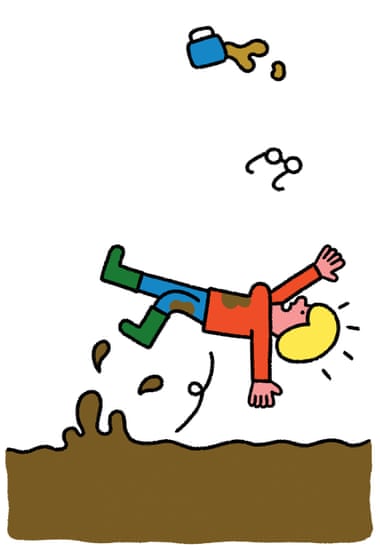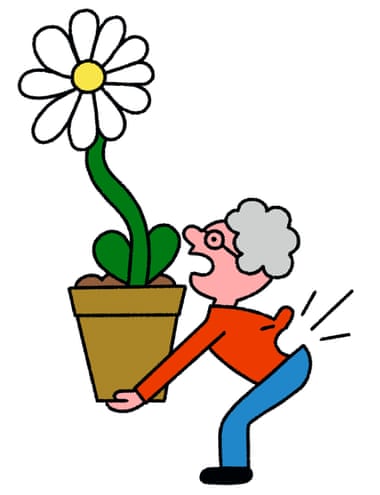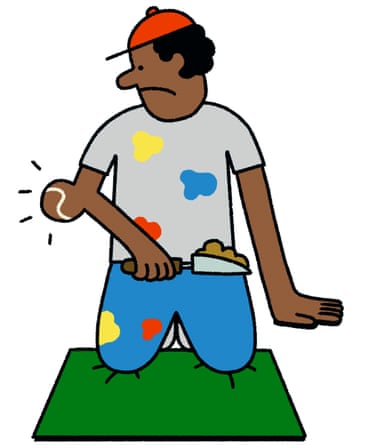Mand earliest memory of an accident in the garden came when, aged four or five, my parents hired a power scythe to cut the meadow we rented from the church next door. As my dad paused for a second, the rickety old engine coughed, knocking the brake free, and the scythe lurched toward a disobedient child standing where he’d been told not to. I remember my dad shouting at me to move but my little legs were frozen. As it struck, I tumbled in a blur until he lifted me from danger. I’m forever grateful to him for saving all the parts of me that I might not now have.
But not all gardening injuries are of such high-drama. Through my 30 years of gardening I’ve had my fair share of cuts and falls. I’m not particularly clumsy – it’s just that bountiful gardens carry bountiful risk, as the 300,000 people a year who go to hospital from gardening injuries can test. But we must persevere because gardening es good for us, physically and mentally. With that in mind, here are the most common gardening injuries – and how to avoid them.
Injuries from power tools
It’s lawnmowers and hedge trimmers that injure most, sending 9,600 people to hospital a year. Strimmers, too. I once hit a stone causing the blades to ricochet dangerously close to my toes. Luckily I always wear metal capped boots.
Many injuries come from people ignoring the guidance or not maintaining the machines, leading to worn bits breaking off or you having to strain more, which can cause unpredictable slips.
Always clean, sharpen and check them between every use, and oil parts that need lubrication. I always wear eye protection and gloves when using strimmers and hedge trimmers, and gloves when handling the blades. Plus, it should go without saying, turn machines off before going anywhere near moving parts.
Cuts from sharp tools
Regular sharpening of cutting tools, such as secateurs, shears and knives actually reduces the number of accidents by minimizing the force needed when using them. However, accidents do happen, as I found out when I cut myself while actually sharpening my secateurs, very nearly joining the 6,500 people who are hospitalized by secateurs, shears and pruners every year. Most cuts can be avoided, or lessened, by wearing strong protective gardening gloves. When it comes to sharp tools, carry them about the garden like grenades.
Thorns and splinters
I’m not a fan of roses, partly because of their thorns, unavoidable during the annual wrestle to prune unruly bushes. Other spiky plants include holly, berberis and the lethal pyracantha, all beautiful burglar deterrents that have scarred my forearms. Thorns not only make a painful puncture wound, but they can cause infection. If you’ve been stabbed, wash the cut as soon as possible with soap. Seek medical assistance if redness spreads or the wound is particularly so – both signs of infection. Wear thick gardening gloves when pruning and work slowly. When the inevitable happens and you still get scratched, channel Ripley in the final scene of Aliens – I do, and always win, eventually.

hearing damage
Given all the blades around, damaging your hearing probably isn’t high on worry lists but loud sounds can cause long-term loss of hearing and tinnitus. Exposure to mowers, drills and strimmers can be reduced using ear defenders with a noise reduction rating of between 25 and 35 decibels, the higher the better. Restricting the length of exposure helps, too. Of course, the quietest technique is to use traditional hand tools wherever you can, giving your ears, and your neighbors, a more peaceful experience.
Eye injuries
Every vegetable grower will know the unlikely danger represented by a bamboo cane – unseen they can easily jab you in the eye when bending down to weed. I should know, having done this twice, luckily closing my eyes just in time. Hedges throw their branches at my eyes regularly too, no doubt revenge for pruning them. Consider wearing goggles or toughened gardening glasses and place upturned plant pots or rubber caps on canes to reduce harm, as well as to make them more visible. Old terracotta pots look particularly shabby chic.
slips and falls
It may sound mundane but falls in gardens are the most common risk, affecting 115,000 people a year. I’ve tripped on carelessly placed hoses and rakes, down poorly planned slopes, up equally bad steps, and tumbled face first over plant pots.
Putting tools away obviously helps, as does lighting paths and steps at night. Tripping on slopes and steps happens when changes in level aren’t clear, when steps are too tall or short, or slopes aren’t at the right gradient. If possible hire a professional landscaper who will know the correct sizes and slope angles to prevent accidents.

Falls from ladders are also a big risk. Always use them on a solid, level surface with someone with you at all times. If you are working above certain heights you may require PPE such as a suitable helmet – or, better yet, leave it to the professionals,
Back pain from poor technique
A common gardening injury, and one I know well, is back pain, usually caused by lifting heavy pots and bags of compost with poor technique, or weeding for long periods of time. There is an easy way to avoid it: if something feels too heavy to lift, stop and seek help. Always weed or dig from a standing position using long-handled spades, forks and hoes, or squat or kneel for short periods of time to use hand tools. Take regular breaks and warm up by doing simple back stretches. Many professional gardeners swear by yoga and pilates; you’ll often find me doing cat-cow among the compost.
Repetitive strain injuries
After a particularly energetic bout of digging up ground elder with a handfork, I’m currently suffering from painful tennis elbow. Despite its name, it’s gardeners who suffer it the most; it should be renamed. Overdoing repetitive digging and pruning can cause tiny tears or inflammation in the tendons attaching your forearm muscle to your elbow joint – similar injuries can happen to knees and wrists. It should heal in time provided you rest – easier said than done in growing season – and avoid the activity that caused it, but always seek advice from a physiotherapist.

Reactions to plant sap
Everyone knows giant hogweed’s sap can cause blistering in sunlight (photosensitivity), but few know the other plants we brush past every day that can cause even worse reactions. At 3-4m tall, giant hogweed is the easiest to avoid but common wild parsnip is easily missed.
Euphorbias, which are found in almost every UK garden, cause skin blistering too – my ear once became like bubblewrap after an encounter with it. Many garden plants are poisonous if eaten, with the common ornamental flower Aconitum (also called wolf’s-bane) among the most deadly. Common ivy can cause rashes and breathing difficulty when handled by some people.
A little research to see what the more risky plants look like is all that’s needed. If you have a rash following contact with a certain sap or find that you have accidentally eaten a poisonous plant, seek medical attention immediately.
“,”isTracking”:false,”isMainMedia”:false,”source”:”The Guardian”,”sourceDomain”:”theguardian.com”}”>
Sign up to our Inside Saturday newsletter for an exclusive behind the scenes look at the making of the magazine’s biggest features, as well as a curated list of our weekly highlights.
Sunburn
I’m used to my friends making lobster jokes about my skin on holiday but when I started spending more time gardening in my early 30s, I wasn’t used to my skin burning on mild UK spring days. Always have a high factor sun block to hand, even on days you wouldn’t expect it, because time passes faster when you are lost in deadheading.
www.theguardian.com
George is Digismak’s reported cum editor with 13 years of experience in Journalism